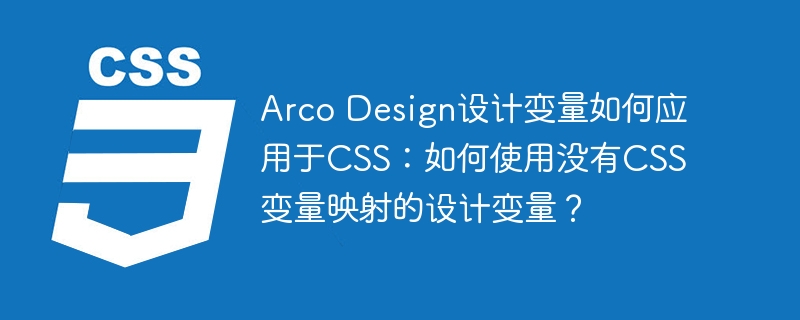 Web Front-end
Web Front-end
 CSS Tutorial
CSS Tutorial
 How to apply Arco Design Variables to CSS: How to use design variables without CSS variable mapping?
How to apply Arco Design Variables to CSS: How to use design variables without CSS variable mapping?
How to apply Arco Design Variables to CSS: How to use design variables without CSS variable mapping?

In-depth interpretation of CSS application of Arco Design variables: cleverly dealing with non-CSS variables
Arco Design provides a powerful design variable system to help developers maintain consistency in project design styles. However, not all design variables are directly mapped to CSS variables (such as var(--color-text-1) ), which brings challenges to some developers. This article will explain in detail how to effectively utilize design variables that do not directly correspond to CSS variables.
Some Arco Design design variables can be used directly in CSS variables (such as var(--color-text-1) ). However, other variables only provide variable names and lack corresponding CSS variables. How to reference these variables?
The key is to customize variables . We can use preprocessors, such as Sass or Less, to define custom variables and assign them to the value corresponding to the variable name provided by Arco Design.
For example, suppose Arco Design provides a design variable named $textColor with a value of #333 but no corresponding CSS variable. We can use Sass to write the following code:
// Define custom variable $textColor in Sass: #333;
// Use custom variable h1 in CSS {
color: $textColor;
} This code first defines a variable $textColor in Sass and assigns the value to #333 (please find the corresponding value according to the actual Arco Design variable document). Then we can use this custom variable $textColor in CSS just like using a normal CSS variable.
In this way, we can apply Arco Design's design variables to the project, even if these variables do not have a direct corresponding CSS variable. Remember, #333 is just an example value, be sure to consult Arco Design's official documentation for accurate design variable values.
With custom variables, you can easily incorporate Arco Design's design language into your project, ensuring consistency and efficiency.
The above is the detailed content of How to apply Arco Design Variables to CSS: How to use design variables without CSS variable mapping?. For more information, please follow other related articles on the PHP Chinese website!

Hot AI Tools

Undresser.AI Undress
AI-powered app for creating realistic nude photos

AI Clothes Remover
Online AI tool for removing clothes from photos.

Undress AI Tool
Undress images for free

Clothoff.io
AI clothes remover

Video Face Swap
Swap faces in any video effortlessly with our completely free AI face swap tool!

Hot Article

Hot Tools

Notepad++7.3.1
Easy-to-use and free code editor

SublimeText3 Chinese version
Chinese version, very easy to use

Zend Studio 13.0.1
Powerful PHP integrated development environment

Dreamweaver CS6
Visual web development tools

SublimeText3 Mac version
God-level code editing software (SublimeText3)

Hot Topics
 How to use bootstrap in vue
Apr 07, 2025 pm 11:33 PM
How to use bootstrap in vue
Apr 07, 2025 pm 11:33 PM
Using Bootstrap in Vue.js is divided into five steps: Install Bootstrap. Import Bootstrap in main.js. Use the Bootstrap component directly in the template. Optional: Custom style. Optional: Use plug-ins.
 The Roles of HTML, CSS, and JavaScript: Core Responsibilities
Apr 08, 2025 pm 07:05 PM
The Roles of HTML, CSS, and JavaScript: Core Responsibilities
Apr 08, 2025 pm 07:05 PM
HTML defines the web structure, CSS is responsible for style and layout, and JavaScript gives dynamic interaction. The three perform their duties in web development and jointly build a colorful website.
 Understanding HTML, CSS, and JavaScript: A Beginner's Guide
Apr 12, 2025 am 12:02 AM
Understanding HTML, CSS, and JavaScript: A Beginner's Guide
Apr 12, 2025 am 12:02 AM
WebdevelopmentreliesonHTML,CSS,andJavaScript:1)HTMLstructurescontent,2)CSSstylesit,and3)JavaScriptaddsinteractivity,formingthebasisofmodernwebexperiences.
 How to write split lines on bootstrap
Apr 07, 2025 pm 03:12 PM
How to write split lines on bootstrap
Apr 07, 2025 pm 03:12 PM
There are two ways to create a Bootstrap split line: using the tag, which creates a horizontal split line. Use the CSS border property to create custom style split lines.
 How to set up the framework for bootstrap
Apr 07, 2025 pm 03:27 PM
How to set up the framework for bootstrap
Apr 07, 2025 pm 03:27 PM
To set up the Bootstrap framework, you need to follow these steps: 1. Reference the Bootstrap file via CDN; 2. Download and host the file on your own server; 3. Include the Bootstrap file in HTML; 4. Compile Sass/Less as needed; 5. Import a custom file (optional). Once setup is complete, you can use Bootstrap's grid systems, components, and styles to create responsive websites and applications.
 How to insert pictures on bootstrap
Apr 07, 2025 pm 03:30 PM
How to insert pictures on bootstrap
Apr 07, 2025 pm 03:30 PM
There are several ways to insert images in Bootstrap: insert images directly, using the HTML img tag. With the Bootstrap image component, you can provide responsive images and more styles. Set the image size, use the img-fluid class to make the image adaptable. Set the border, using the img-bordered class. Set the rounded corners and use the img-rounded class. Set the shadow, use the shadow class. Resize and position the image, using CSS style. Using the background image, use the background-image CSS property.
 How to use bootstrap button
Apr 07, 2025 pm 03:09 PM
How to use bootstrap button
Apr 07, 2025 pm 03:09 PM
How to use the Bootstrap button? Introduce Bootstrap CSS to create button elements and add Bootstrap button class to add button text
 How to resize bootstrap
Apr 07, 2025 pm 03:18 PM
How to resize bootstrap
Apr 07, 2025 pm 03:18 PM
To adjust the size of elements in Bootstrap, you can use the dimension class, which includes: adjusting width: .col-, .w-, .mw-adjust height: .h-, .min-h-, .max-h-





